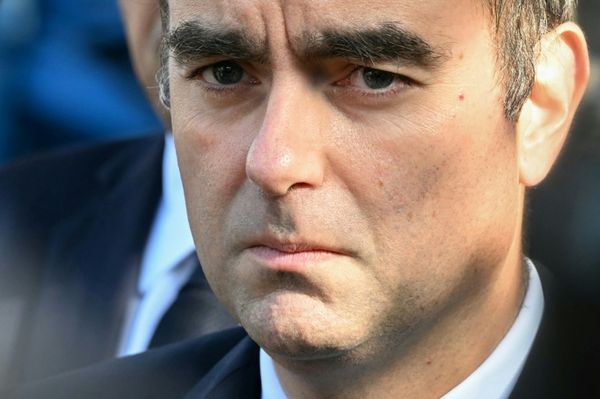Shoplifting is a fact of life for retailers. But a surge in violent and organized retail crime is triggering huge losses for Target, Kohl's, Nordstrom, Walmart and other stores. And the problem is getting worse.
"Shrink was a big headwind for a lot of the retailers in the second quarter, causing many of them to experience greater gross margin pressure than expected. And I think that's what caused the pressure on the stocks," said Joe Feldman, senior managing director at Telsey Advisory Group. Some may have had a decent quarter, but guidance included additional shrink pressure. "Any way you slice it, shrink did flare up and was running as a bigger pressure point for a broader group of retailers than I think people anticipated," he said.
Retail theft losses swelled to $112.1 billion in 2022, up 19% from $93.9 billion the year before. Those somber numbers come from the 2023 National Retail Security Survey, released in late September by the Loss Prevention Research Council and the National Retail Federation. Earnings out this summer showed a widening impact from "inventory shrinkage" — retail speak for theft. Several big chains, including Target and Dick's Sporting Goods, fingered rising theft as a cause of earnings shortfalls in the quarter.
Rising Theft Adds To Underperformance
Retail stocks face a number of headwinds in 2023, but rising theft has added to their underperformance, including TGT stock, Nordstrom and Dick's Sporting Goods. Costco Wholesale, which has not seen a big increase in theft, is a rare retail stock trading near highs.
Retailers are cutting store hours and increasing security in response. Many are closing key locations. That comes at a cost to company performance, shareholders and the communities they serve. Employees feel uneasy. Customers experience more friction while being left with fewer resources and purchasing options.
"Everything points to a continuing increase in retail crime," said Cory Lowe, senior research scientist at the Loss Prevention Research Council.
The council provides research and support to major retail chains. Its founding members include Target, Walmart, Gap and Home Depot.
Violent Shoplifting Increases
In the 2023 survey of 117 retail brands, 88% reported shoplifters have grown more aggressive and violent than a year earlier. As for perpetrators of organized retail crime, ORC for short, 67% of respondents say they're growing even more violent and aggressive, compounding on increased violence from prior years.
"Retailers are seeing unprecedented levels of theft coupled with rampant crime in their stores, and the situation is only becoming more dire," wrote David Johnson, vice president of asset protection and retail operations at the NRF. "Far beyond the financial impact of these crimes, the violence and concerns over safety continue to be the priority for all retailers, regardless of size or category."
Seventy-eight percent of respondents in the latest survey said organized retail crime was more of a priority.
Join IBD experts as they analyze leading stocks and the market on IBD Live
Retail Theft Red Flags In Earnings
"Losses from theft are at historical highs," CEO Erik Nordstrom said in Nordstrom's August earnings call. "And I'd say we find it unacceptable, and it needs to be addressed" on a variety of fronts. "That being said, while it's unacceptable, it is within our plans," he added.
"There's things within our control that we can invest in," Nordstrom said. "But it also involves partnering with local jurisdictions, law enforcement. I think legislation is part of the mix too."
Nordstrom did not elaborate on what such legislation would entail.
Target Sees 120% Increase In Thefts
Target CEO Brian Cornell noted retail theft and organized crime are growing problems. The discount giant said it saw a 120% increase in theft incidents involving violence or threats of violence during the first five months of 2023. In May, Target warned that inventory shrink would reduce profits by more than $500 million compared to last year.
Dick's Sporting Goods CEO Lauren Hobart said second-quarter earnings missed views largely due to higher inventory shrink. Organized retail crime and general theft are dampening full-year expectations, she said on the Q2 earnings call. Dick's Sporting Goods cut full-year earnings per share targets by 10%.
Kohl's, Dollar Tree, Home Depot and Academy Sports & Outdoors all reported shrink impacts on gross margins.
Some companies, like Walmart and Lowe's, mentioned shrink not being a particular issue and holding flat this year, Feldman added. However, they saw a greater uptrend in the years prior. "It's just that they have been dealing with this for a long time," Feldman said.
Inventory shrink hasn't been as big of a problem for Costco. On the Q4 earnings call Sept. 26, Costco CFO Richard Galanti said inventory shrink has only increased "by a couple basis points" over the past several years. He attributed the small rise to the rollout of self-checkout.
Costco, however, tends to supervise merchandise and requires employees to check receipts at the exit. The checkout process and membership programs can create obstacles that make smash-and-grabs more difficult, Feldman said.
"It's more that the rate of change has increased pretty dramatically, either this year for some, or over the past couple of years for others," he said.
Retail Crime Spurs Store Closures
Meanwhile, many retailers are reducing hours or closing locations due to retail crime, disorder and violence, according to the 2023 Retail Security Survey. Forty-five percent said they cut hours at one or more stores for these reasons. Some 28% reported closing at least one location. Nearly 30% of respondents reduced or altered in-store products to deter crime.
Dollar Tree plans to relocate certain inventory behind check stands, add lock cases and discontinue some frequently stolen items, CEO Richard Dreiling said during August's Q2 earnings call.
On Sept. 26, Target said it will close nine locations in New York City, Seattle, San Francisco and Portland, effective Oct. 21. "We cannot continue operating these stores because theft and organized retail crime are threatening the safety of our team and guests," the company wrote.
Target said it "invested heavily" to prevent theft and organized retail crime before the decision, including adding security team members, using third-party security and implementing theft-deterrent tools, such as additional locking cases. Target also partnered with Homeland Security Investigations.
Nordstrom closed its flagship San Francisco store at the Westfield San Francisco Centre on Aug. 27. That followed the closure of a nearby Nordstrom Rack in July. "The dynamics of the downtown San Francisco market have changed dramatically," Jamie Nordstrom, chief stores officer, told the media after the May announcement. The company still has 16 Nordstrom and Rack stores in the San Francisco Bay area.
The Westfield mall, in a statement to the Washington Post, blamed the closure on "the deteriorating situation in downtown San Francisco," as well as "unsafe conditions for customers, retailers and employees."
A Top-Performing Store Closed Down
REI announced plans in April to close one of its best-performing stores in downtown Portland, Ore., citing shoplifting and higher crime. The outdoor retailer spent more than $800,000 on extra security in 2022, it told MarketWatch. A representative said REI also dealt with "unsuccessful lease renewal negotiations" and the security investments "weren't sustainable."
Whole Foods closed its flagship store in downtown San Francisco in April after opening the location in March 2022. "If we feel we can ensure the safety of our team members in the store, we will evaluate a reopening of our Trinity location," a Whole Foods spokesperson said in a statement.
Walmart CEO Doug McMillon warned CNBC last December that stores would close if theft doesn't slow. Walmart closed four Chicago stores in April, citing annual losses in the "tens of millions of dollars," but did not explicitly mention theft. In total, Walmart announced plans to shutter 22 stores in 14 states and Washington, D.C., through mid-July. Still, the retailer opened over 120 stores in the past year through Q2.
CFO John Rainey noted in the earnings call that the Walmart stores with the highest shrink rates are in areas with the lowest prosecution rates for this type of crime.
Walmart plans to reopen one Atlanta location in May 2024 after thieves set fire to the store in January to distract from their crimes. Similar instances occurred at another Walmart and Target in the area. Plans call for the reopened store to include a workspace for law enforcement. Walmart used that setup before.
Starbucks closed about 20 locations in major cities last year, citing safety concerns. Many of the closures occurred after employees began voting to unionize. Starbucks denied accusations of union-busting and has since opened new shops in some of those cities.
Shoplifting Is Just One Type Of Retail Theft
Ordinary theft and organized retail crime both result in stolen merchandise. But the nature and intent differ. Ordinary theft usually involves individuals, such as shoplifters or store employees stealing goods for personal use. Organized retail crime ranges from local individuals to international rings who steal products for resale or larger-scale fraud.
"You have highly sophisticated, organized crime rings that are stealing incredibly large quantities of products. In some cases, (they are) reintroducing those into legitimate supply chains so that legitimate retailers are actually buying stolen products and selling them," said Lowe at the Loss Prevention Research Council.
Videos of flash mob smash-and-grab thefts have gone viral. In late September, a group of juvenile robbers targeted Apple, Lululemon, Foot Locker and other stores in Philadelphia, resulting in 15 to 20 arrests. Street gangs often participate in lower-level organized retail crime or act as "boosters" for larger criminal groups.
Boosters may be professional thieves, gang members or the economically vulnerable. They steal specific items for crew bosses or a fence, staging attacks across the entire supply and distribution chain, from cargo shipments to retail stores.
Fences buy the stolen goods and resell them to witting and unwitting customers online or to wholesalers, pawnshops and similar channels. They remove anti-theft tags and repackage products to appear new. Some organized retail crime groups will repackage security devices and employ money launderers to process illicit proceeds.
Everyday Shoplifting Vs. Organized Crime Rings
The more sophisticated groups try to fly under the radar to avoid detection by law enforcement. The less sophisticated are more likely to resort to violence.
Violence can range from intimidating store employees to attacking them and other workers along supply chains.
"Every bit of research shows that a small portion of the offending population is responsible for the majority of incidents," Lowe said. He cited one retailer's case management system that reported 10% of the known offenders were responsible for 90% of their losses.
The more sophisticated rings work on defined tasks within an established hierarchy with a ringleader to orchestrate operations, similar to racketeering enterprises, according to the NRF.
About 45% of organized retail crime (ORC) groups use online marketplaces for resale, based on the NRF and K2 database of known offenders and available fencing information. Some sites are taking preventive measures. By the end of 2021, Amazon.com required all new sellers to pass in-person verification to operate in major markets. As of December 2021, eBay requires sellers to provide personally identifying information.
Keywords Abet Criminals, Resellers
Peer-to-peer e-commerce sites, such as Craigslist and Facebook Marketplace, tend to have weaker identification policies. NRF and K2 analysis of 8,821 listings on Craigslist and Facebook Marketplace found about 25% of search results were for large quantities of typical ORC products or with keywords associated with retail crime. Such keywords for resellers include "new with tag," "designer NWT" and "BNWT" (brand new with tag).
The latest ORC Report noted some social media platforms and mainstream websites host forums on facilitating retail theft. Such communities, like r/shoplifting_hub on Reddit, contain shoplifting tips, information about retailer procedures, store layouts and camera locations. Some pop up under different names after being shut down or alter phrases to avoid detection.
Meanwhile, videos tagged with shoplifting-related search terms have generated millions of views on sites like TikTok. That suggests a broader social acceptance of retail theft and indifference to buying stolen goods, the NRF says.
Favorite Products In Retail Theft
Organized retail crime groups favor large national retailers and big box chains, according to the latest NRF and K2 Integrity Organized Retail Crime Report. They largely target everyday consumer goods with a favorable mix of monetary value and ease of theft and resale, NRF data shows. Some 81% of 116 identified organized retail crime groups exclusively steal general consumer goods.
The most targeted items have remained steady, NRF says. They include apparel, health and beauty products, infant supplies, accessories, houseware, home improvement products, and toys and laundry products. Brand names are more popular than generics.
Giant Food last month said it would pull highly targeted health and beauty brands at an unprofitable store in Southeast Washington, D.C., the Washington Post reported. The regional supermarket chain will replace Tide, Colgate, Dove, Degree, Pantene and Schick products with its own brand. Other nearby locations locked up products on those aisles or removed them, company officials said. The Giant Food on Alabama Avenue is the only Washington, D.C. major grocer east of the Anacostia River in Ward 8.
Stolen products include over-the-counter medicines and baby formula that are put up for resale. These may not be stored properly, threatening the product's integrity and posing potential health risks. Some criminal groups will repackage and relabel stolen products to falsely extend the expiration date or disguise the fact it was stolen.
Organized retail crime is less likely to target luxury goods, likely due to enhanced security, according to the NRF and K2 report. Only about 11% of the known ORC groups studied targeted luxury products.
Cargo thieves frequently target electronics, according to NRF data.
Retailers Face Continued Headwinds
Can retailers curb thefts anytime soon? Stifel analysts expect shrink to remain a headwind into fiscal 2024, the firm wrote in a research note after Dick's Sporting Goods' August earnings. But it won't impact retailers equally.
One problem is the lack of data and hesitance by retailers to collaborate or share information. U.S. crime statistics are based on police reports. But only about 50% of retail crime is reported to law enforcement, according to a Loss Prevention Research Council survey of 177 loss prevention managers last year.
Crime rates and reporting differ by city, state and region. Retailers' top reason for not reporting crime is because they believe police won't respond or investigate while prosecutors won't prosecute. Population size, amount and severity of local crime, and law enforcement resources also play roles.
Lowe is working on a data set to examine the relationship between local policies and retail crime. Los Angeles, San Francisco and Houston are among the cities most affected by retail theft.
Retail Crime Prevention Measures
In the meantime, retailers are spending more to protect their merchandise. They're upgrading their strategies from simple lockboxes for in-store merchandise to greater surveillance and item-ruining or product-disabling devices. They can equip apparel with tamper-proof traps that deploy ink-like substances when stolen. Some stores changed layouts and displays to delay offenders and make it harder for smash-and-grabs.
More advanced measures include deploying mobile security towers and license plate readers in parking lots, incorporating RFID tags and facial-recognition cameras.
Still, it's up to law enforcement to investigate and prosecute offenders, Lowe said. "There's limits to how much retailers can move the needle in terms of increasing the perceived risks associated with committing crime," he said.
"You either need local law enforcement to help prosecute crimes at a lower dollar level, and you also need better crime fighting against the resale of the product," Feldman said, such as tracking stolen merchandise and identifying third-party sites where they're sold.
"It's a real challenge for the industry right now, and it's not clear how quickly it's going to go away," Feldman said.
Catch The Next Big Winning Stock With MarketSmith
Congressional Efforts To Stem Retail Theft
In July, the National Retail Federation urged Congress to pass the Combating Organized Crime Retail Act. The legislation would create an interagency ORC Center within Homeland Security Investigations. It also would toughen the criminal code to better prosecute organized retail crime.
The Organized Retail Crime Center would develop national-level intelligence via information sharing across federal, state and local agencies. It would support collaborative investigations and serve as a training hub.
The criminal code would boost enforcement tools and emphasize organized retail crime.
Congress is taking measures against resellers on e-commerce sites. Lawmakers passed the INFORM Consumers Act in 2022. That requires online marketplaces to verify high-volume sellers to curb flipping of stolen products. The law took effect in August.
"Organized retail crime will remain the top priority," the NRF wrote. "Expenditures against retail theft have factored into construction budgets, merchandising budgets, information technology, and staffing and training budgets. This is an enormously important and expensive effort for the retail industry. The continuing growth of organized retail crime and the damage it causes to communities dictate that something needs to be done."
You can follow Harrison Miller for more stock news and updates on X/Twitter @IBD_Harrison







